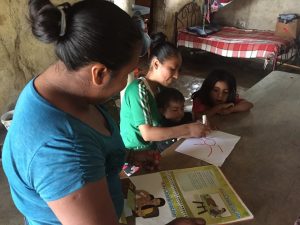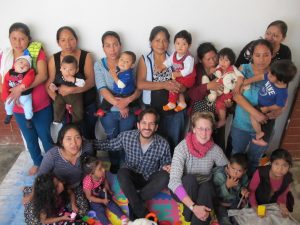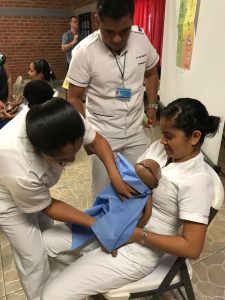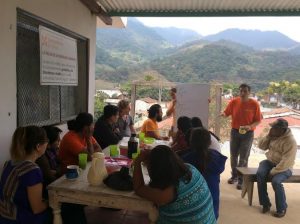Written by: Susan Wood, PNP-BC, MPH, IBCLC
“We go. We make house calls. We build health systems. We stay.”
These simple principles are the mission statement of Partners In Health, an organization which has grown to include eleven sites around the globe. With its commitment to provide the best healthcare to the poorest communities in the world, PIH works on a multitude of levels: training community health workers (acompañantes) and healthcare providers (physicians and nurses), building hospitals and clinics, doing home visits, and removing barriers to good health (such as providing clean water and food, if needed.). Each PIH site reflects the unique needs of each country and community, and only serves at the invitation of local governments and health systems.
Partners In Health (also known in Spanish as Compañeros en Salud or CES) began working in Chiapas in 2011. Chiapas is the poorest state in Mexico, and it has the country’s second highest infant and maternal mortality rates. In addition, chronic and infectious diseases, as well as mental illnesses, have historically gone untreated due to non-existent access to care. Working in partnership with the Ministry of Health, CES now staffs ten rural clinics in the Sierra Madre mountains with Mexican physicians (pasantes), who are required to do one year of social service following medical school. The pasantes work as a team with their community’s acompañantes to provide healthcare, health education, and social support to those in need. CES, in turn, supports both groups with living stipends and offers the pasantes a monthly Global Health course, taught by visiting medical and nursing faculty.
I arrived in Jaltenango, a small and remote town in central Chiapas, in January. This is where the main office of CES is located, down a dusty road at the edge of town. Most of the staff are former pasantes who became committed to the goal of health equity during their year of service at CES, and have stayed on as supervisors for current pasantes. Others are volunteers from the US, often recent college graduates on their way to medical school. All were warm and welcoming to me, and with each introduction came a big hug! Despite my rusty Spanish and comparatively advanced age (most of the CES staff are in their mid twenties to thirties), it wasn’t long before I felt integrated into the larger team. Indeed, over the course of the month I was there, I saw a variety of visiting faculty from the US come and go (many of whom were physician volunteers who came for varying lengths of time to teach), who also quickly became a welcome part of CES.

A Maternal Health acompañante in the community of Salvador Urbina, helping a mother teach fine motor skills to her children.
I was a Maternal Health Nurse Volunteer and my role was varied, reflecting the range of needs identified by CES. The first area of need was in early child development. CES was launching its first infant stimulation programs in several rural communities. Over the course of two weeks, I worked with the pasantes to train maternal health acompañantes in basic principles of early child development, and then helped support the implementation of these infant stimulation groups. Emblematic of the different challenges facing each community, one enthusiastically embraced their new infant group, whereas the other community – disproportionately impacted by social stressors such as alcoholism and unemployment – would need additional training and support.
CES is also focused on reducing morbidity and mortality in the maternal newborn population by providing access to birth hospitals and skilled care for pregnant women. Most of the acompañantes and pasantes I met had been witness to the death of a woman or her newborn at the time of delivery, often the result of home birth without skilled care. In order to accommodate pregnant women close to delivery, CES has built a maternal home in Jaltenango, the Casa Materna. A warm and welcoming facility of 10 beds, the Casa Materna allows women from remote communities to be close to skilled maternity care when they go into labor. CES also provides training on evidence-based maternity practices to obstetric physicians and nurses who work in the local community hospital. I spent a week in the delivery room of the hospital, observing the OB nurses as they cared for laboring women and delivered their babies, and worked collaboratively with them to promote skin-to-skin and the early initiation of breastfeeding. These nurses were highly skilled and eager to learn. In my final role teaching Helping Babies Breathe with other visiting medical faculty (an initiative launched by the American Academy of Pediatrics to reduce neonatal deaths within the first minutes of life in low resource settings) these same nurses were our most enthusiastic students. Many of their questions reflected their desire to improve the quality of care to laboring and postpartum women, yet they reported feeling powerless to question their physician colleagues. Like much of the rest of the world, nurses in Mexico struggle to work collaboratively as an equal part of a medical team, and change is incremental. Perhaps one of my most valuable contributions to the role of nursing in Mexico was simply to be present, alongside my medical colleagues, demonstrating the possibility of partnership in the delivery of care.
A mere seven years ago, much of rural Chiapas lacked access to basic healthcare. With the arrival of CES, many remote communities now have a reliable primary healthcare system which provides urgent care in outpatient clinics, treatment of chronic and infectious diseases and mental illness, health education, and an improved maternal health infrastructure. Regular training of the local healthcare workforce – local physicians, pasantes, nurses, acompañantes – reinforces and expands this capacity. Compañeros en Salud has brought change and hope to the poorest region of Mexico, and I was honored to have been a part of their efforts.
(The individuals in these images gave their expressed verbal consent to be photographed.)


